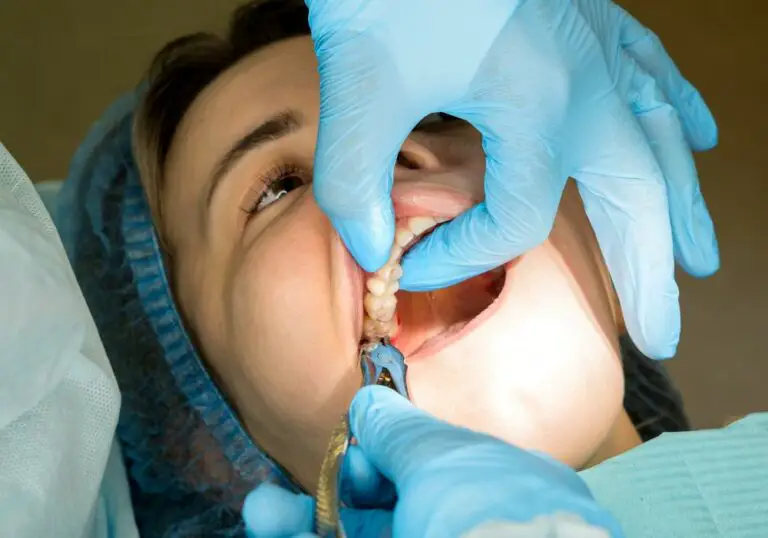Are you experiencing a toothache that just won’t go away? Did you know that a tooth infection can actually affect your whole body? That’s right! A tooth infection, also known as a tooth abscess, is a collection of pus and bacteria that forms inside the tooth or gum. If left untreated, it can spread to other areas of the body, causing serious and potentially life-threatening complications.
Some common signs and symptoms of a tooth infection spreading to the body include fever, fatigue, and swelling in the mouth, face, cheeks, or neck. You may also experience throbbing, severe pain in the tooth, mouth, or jaw, as well as bad breath and/or taste in the mouth. If you are experiencing any of these symptoms, it’s important to seek medical attention right away to prevent the infection from spreading further.
In this article, we will explore the causes, symptoms, and prevention of tooth infections spreading to the body. We will also provide tips on how to keep your teeth and gums healthy to prevent tooth infections from occurring in the first place. So, if you’re concerned about the health of your teeth and want to learn more about how tooth infections can affect your whole body, keep reading!
Understanding Tooth Infections
Tooth infections, also known as tooth abscesses, are a common dental problem that occurs when bacteria invade the pulp of your tooth. If left untreated, the infection can spread to other parts of your body, causing serious complications.
There are two types of tooth infections: periapical abscess and periodontal abscess. A periapical abscess occurs at the tip of the tooth’s root, while a periodontal abscess occurs in the gums next to the tooth.
Some common causes of tooth infections include poor oral hygiene, tooth decay, gum disease, and trauma to the tooth. Tooth infections can also occur as a result of a weakened immune system, such as in people with diabetes or HIV.
Symptoms of a tooth infection may include severe toothache, sensitivity to hot and cold temperatures, swelling in the face or jaw, fever, and swollen lymph nodes. If you experience any of these symptoms, it is important to see a dentist as soon as possible.
To diagnose a tooth infection, your dentist will perform a physical examination and may take X-rays to determine the extent of the infection. Treatment for a tooth infection typically involves draining the abscess and prescribing antibiotics to kill the bacteria causing the infection.
In addition to seeking treatment for a tooth infection, it is important to practice good oral hygiene to prevent future infections. This includes brushing your teeth twice a day, flossing daily, and visiting your dentist regularly for check-ups and cleanings.
Overall, tooth infections can have serious consequences if left untreated. If you suspect you may have a tooth infection, it is important to seek prompt dental care to prevent the infection from spreading to other parts of your body.
How Tooth Infections Spread
Tooth infections, also known as dental abscesses, occur when bacteria invade the soft tissue inside the tooth or the surrounding gums. If left untreated, the infection can spread to other parts of the body, causing serious health problems.
Here’s how tooth infections spread:
- Bacteria enters the tooth: Bacteria can enter the tooth through a cavity, crack, or chip. Poor oral hygiene can also lead to the growth of bacteria in the mouth.
- Infection spreads to the root: Once bacteria enter the tooth, they can spread to the root and cause an abscess. The abscess is a pocket of pus that forms at the root of the tooth.
- Infection spreads to the gums: If the abscess bursts, the infection can spread to the gums and cause gum disease. Gum disease can cause redness, swelling, and bleeding.
- Infection spreads to the jawbone: If the infection is not treated, it can spread to the jawbone and cause osteomyelitis. Osteomyelitis is a serious bone infection that can cause pain, swelling, and fever.
- Infection spreads to other parts of the body: In rare cases, the infection can spread to other parts of the body, such as the brain or heart. This can cause serious health problems and requires immediate medical attention.
To prevent tooth infections from spreading, it’s important to practice good oral hygiene. This includes brushing your teeth twice a day, flossing daily, and visiting your dentist regularly for check-ups and cleanings.
If you suspect that you have a tooth infection, it’s important to seek medical attention right away. Symptoms of a tooth infection include severe toothache, fever, swelling, and difficulty swallowing.
Impact on the Heart

If a tooth infection is left untreated, it can lead to serious health complications, including affecting your heart. Here’s what you need to know.
Endocarditis Risk
One of the most severe complications of an untreated tooth infection is endocarditis. Endocarditis is an infection of the inner lining of the heart chambers and valves. Bacteria from the infected tooth can enter the bloodstream and spread to the heart, causing inflammation and damage to the heart valves.
People with pre-existing heart conditions, such as damaged heart valves or congenital heart defects, are at higher risk of developing endocarditis. However, anyone with an untreated tooth infection can be at risk.
Symptoms of endocarditis can include fever, fatigue, shortness of breath, and swollen feet or legs. If you experience any of these symptoms, seek medical attention immediately.
To prevent endocarditis, it’s essential to practice good oral hygiene and seek treatment for any dental issues promptly. If you have a pre-existing heart condition, talk to your healthcare provider about taking antibiotics before dental procedures to prevent the risk of infection.
In conclusion, a tooth infection left untreated can lead to severe health complications, including affecting your heart. It’s essential to take care of your oral health and seek treatment for any dental issues promptly to prevent any potential risks.
Impact on the Brain
A tooth infection can lead to serious health problems if left untreated. If the infection spreads to other parts of your body, it can have a severe impact on your overall health. One of the most severe consequences of a tooth infection spreading is the risk of a brain abscess.
Brain Abscess Risk
A brain abscess is a severe and potentially life-threatening condition that can result from a tooth infection spreading to the brain. A brain abscess is a collection of pus that forms in the brain tissue. It can cause severe headaches, fever, seizures, and other symptoms.
The risk of a brain abscess is relatively low, but it is still a severe consequence of a tooth infection spreading. If you experience any of the symptoms associated with a brain abscess, you should seek medical attention immediately.
To reduce your risk of developing a brain abscess, it is essential to take care of your oral health. Regular dental check-ups and good oral hygiene can help prevent tooth infections from developing and spreading.
If you have a tooth infection, it is essential to seek prompt treatment to prevent it from spreading to other parts of your body. Your dentist may prescribe antibiotics or recommend a root canal to remove the infected tissue and prevent the infection from spreading.
In conclusion, a tooth infection can have severe consequences for your overall health, including the risk of a brain abscess. If you experience any symptoms of a tooth infection or a brain abscess, seek medical attention immediately. Taking care of your oral health can help prevent tooth infections from developing and spreading, reducing your risk of severe health complications.
Impact on the Lungs

When you have a tooth infection, the bacteria can spread from your mouth to other parts of your body, including your lungs. This can lead to a range of respiratory problems and complications.
Pneumonia Risk
One of the most serious risks associated with a tooth infection spreading to the lungs is the development of pneumonia. Pneumonia is a lung infection that can cause inflammation, fluid buildup, and other serious respiratory problems.
If you have a weakened immune system or an existing respiratory condition, such as asthma or chronic obstructive pulmonary disease (COPD), you may be at an increased risk of developing pneumonia as a result of a tooth infection. Additionally, if you have poor oral hygiene or are a smoker, your risk of developing pneumonia may also be higher.
To reduce your risk of developing pneumonia, it is important to seek prompt treatment for any dental infections or other respiratory symptoms. This may include antibiotics, antiviral medications, or other treatments depending on the severity of your condition.
Overall, it is important to be aware of the potential risks associated with a tooth infection spreading to the lungs. By taking steps to maintain good oral hygiene and seeking prompt treatment for any dental or respiratory symptoms, you can help reduce your risk of developing serious complications.
Impact on the Sinuses
When you have a tooth infection, it can potentially affect other parts of your body, including your sinuses. Here’s what you need to know about how a tooth infection can impact your sinuses.
Sinusitis Risk
According to Dr. Michael J. Lewis, a root canal specialist, a tooth infection can sometimes cause chronic sinus infections. This happens when the roots of your teeth become infected, and that infection spreads to your sinuses.
If you have a tooth infection and you start experiencing symptoms like fever, fatigue, or other signs of infection, it’s possible that the infection has spread to your sinuses. This can lead to a condition called sinusitis, which is an inflammation of the sinuses.
Sinusitis can cause a variety of symptoms, including:
- Facial pain or pressure
- Nasal congestion
- Headache
- Fatigue
- Cough
- Sore throat
- Bad breath
- Toothache
If you have a tooth infection and you start experiencing these symptoms, it’s important to seek medical attention right away. Your doctor can help you determine if your sinusitis is caused by a tooth infection and develop a treatment plan to address both conditions.
In some cases, treating the tooth infection may be enough to resolve the sinusitis. However, in other cases, you may need additional treatment, such as antibiotics or surgery, to fully address the sinusitis.
Overall, it’s important to take tooth infections seriously and seek prompt treatment to prevent them from spreading to other parts of your body, including your sinuses.
Preventing Tooth Infections

Tooth infections can cause serious health complications if left untreated. However, there are steps you can take to prevent tooth infections from occurring in the first place.
Regular Dental Checkups
Regular dental checkups are an important part of preventing tooth infections. Your dentist can identify and treat any potential problems before they become serious. It is recommended that you visit your dentist at least once every six months for a routine checkup and cleaning.
During your dental checkup, your dentist will examine your teeth and gums for any signs of decay, gum disease, or other issues that could lead to a tooth infection. They may also take X-rays to check for any problems that are not visible to the naked eye.
Good Oral Hygiene
Good oral hygiene is also essential for preventing tooth infections. This includes brushing your teeth at least twice a day with fluoride toothpaste, flossing daily, and using mouthwash to kill bacteria.
When brushing your teeth, be sure to brush all surfaces of your teeth, including the fronts, backs, and tops. Use a soft-bristled toothbrush and gentle circular motions to avoid damaging your teeth and gums.
Flossing is also important for removing food particles and bacteria from between your teeth and along your gum line. Be sure to use a fresh section of floss for each tooth and gently slide it up and down between your teeth.
In addition to brushing and flossing, using mouthwash can help kill bacteria and freshen your breath. Look for a mouthwash that contains fluoride and antimicrobial agents to help prevent tooth decay and gum disease.
By following these simple steps, you can help prevent tooth infections and keep your teeth and gums healthy for a lifetime.
Treatment Options for Tooth Infections

If you have a tooth infection, it’s important to seek treatment as soon as possible to prevent it from spreading to other areas of your body. Here are some common treatment options for tooth infections:
Antibiotics
Antibiotics are often prescribed to treat tooth infections. They work by killing the bacteria that are causing the infection. It’s important to take the full course of antibiotics as prescribed, even if you start feeling better before you’ve finished the medication. Failure to complete the full course of antibiotics can lead to the infection returning and becoming resistant to antibiotics.
Root Canal Therapy
If the infection has spread to the pulp of the tooth, root canal therapy may be necessary. During a root canal, the infected pulp is removed, and the inside of the tooth is cleaned and disinfected. Once the tooth is clean, it is filled with a material called gutta-percha, and a crown is placed on top to protect the tooth.
Tooth Extraction
In some cases, a tooth infection may be so severe that the tooth cannot be saved. In these cases, the tooth will need to be extracted. After the tooth is removed, the area will be cleaned and disinfected, and stitches may be necessary to close the wound.
It’s important to note that while these treatments can be effective, prevention is always the best course of action. Practice good oral hygiene by brushing twice a day, flossing daily, and visiting your dentist regularly for checkups and cleanings. If you experience any symptoms of a tooth infection, such as pain, swelling, or fever, seek treatment from your dentist as soon as possible.
Frequently Asked Questions
How can a tooth infection affect your health?
A tooth infection can affect your health by spreading to other parts of your body. The infection can enter your bloodstream and travel to your heart, brain, or lungs causing serious health problems. The bacteria from the infection can also weaken your immune system, making it harder for your body to fight off other infections.
What are the potential risks of a tooth infection?
The potential risks of a tooth infection include the spread of the infection to other parts of your body, sepsis, and in rare cases, death. The infection can also cause damage to your teeth and gums, leading to tooth loss or the need for a root canal.
What are the symptoms of a tooth infection spreading?
Symptoms of a tooth infection spreading can include fever, fatigue, swollen lymph nodes, difficulty breathing, and chest pain. If you experience any of these symptoms, seek medical attention immediately.
Can a tooth infection lead to sepsis?
Yes, a tooth infection can lead to sepsis. Sepsis is a potentially life-threatening condition that occurs when your body’s response to an infection damages your tissues and organs. If you suspect you have a tooth infection, it’s important to seek treatment right away to prevent the infection from spreading and potentially leading to sepsis.
What are the dangers of an untreated tooth infection?
The dangers of an untreated tooth infection include the spread of the infection to other parts of your body, sepsis, and in rare cases, death. The infection can also cause damage to your teeth and gums, leading to tooth loss or the need for a root canal.
How long can a tooth infection go untreated before it becomes dangerous?
A tooth infection can become dangerous if left untreated for too long. The length of time it takes for a tooth infection to become dangerous varies depending on the individual and the severity of the infection. It’s important to seek treatment as soon as possible to prevent the infection from spreading and causing serious health problems.







